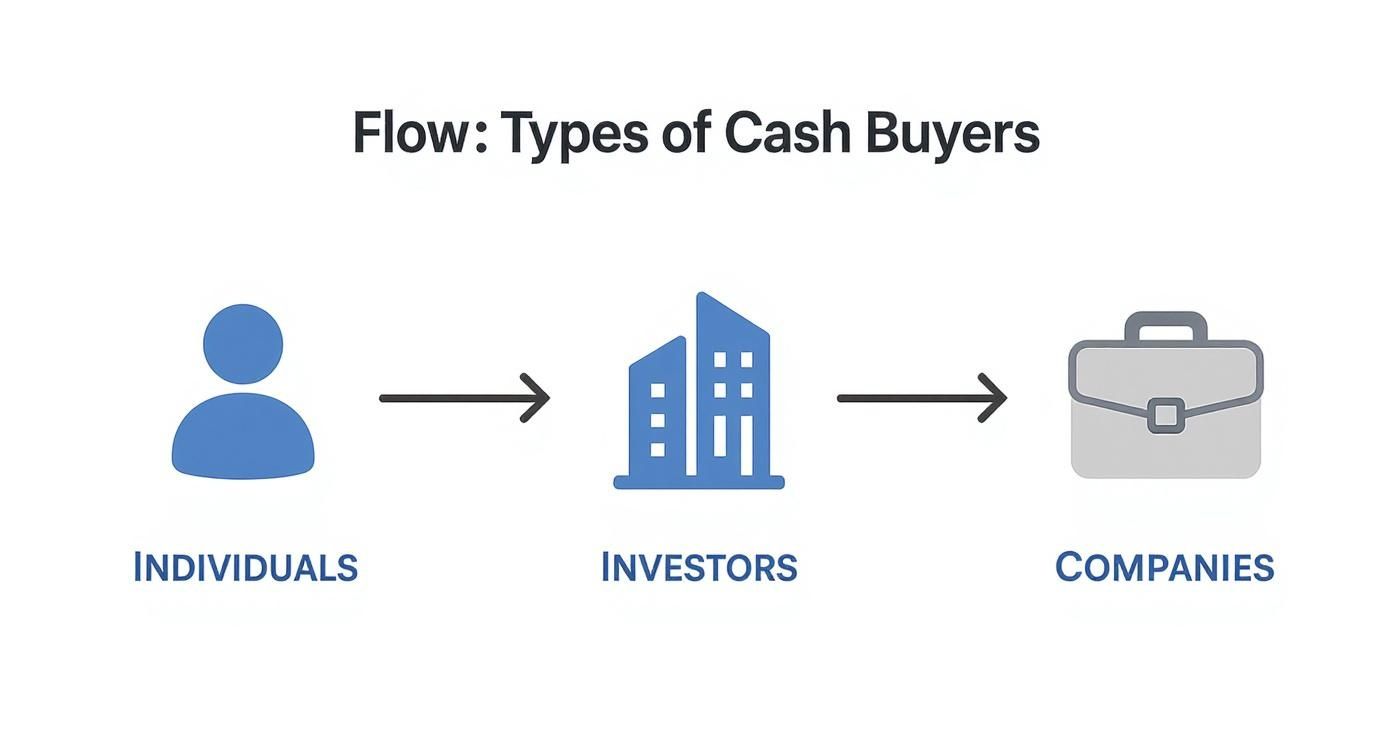Selling your house for cash means the buyer has the funds to purchase your home outright, without needing a loan from a bank. The quick difference between these two methods speeds up the process dramatically by cutting down closing times from 30-60 days to just two weeks while removing financing risks for buyers. The platform provides homeowners with a quick and dependable method to find buyers for their properties.
What a Cash Home Sale Actually Means

Let’s break it down. A cash sale functions as a straightforward transaction which provides instant payment and complete certainty through the transfer of ownership. A traditional sale takes between 30 to 60 days because you must wait for the buyer’s bank to approve their financing. The process of selling through a cash sale can be completed within two weeks or even less in some cases.
Think of a traditional sale as a long, winding road with multiple roadblocks. The buyer must complete three essential steps before obtaining financing which include the financing contingency and bank appraisal and underwriting process. A problem at any of these stops can bring the whole deal to a screeching halt.
A cash sale operates as a direct route which takes you straight from making an offer to completing the closing process.
Traditional Sale vs Cash Sale Key Differences
To really see the difference, it helps to put the two processes side-by-side. The main distinction is where the money comes from—a traditional buyer needs a lender, while a cash buyer uses their own funds. The entire transaction process depends heavily on this basic fact.
| Process Step | Traditional Sale (With Mortgage) | Cash Sale |
|---|---|---|
| Initial Offer | Includes a financing contingency; the deal depends on the buyer getting a loan. | No financing contingency; the offer is firm and backed by available funds. |
| Appraisal | A formal bank appraisal is mandatory to ensure the property is worth the loan amount. | A formal appraisal is usually skipped. The buyer assesses the value themselves. |
| Repairs | Buyer often requests repairs based on inspection findings before the bank will approve the loan. | Properties are typically bought “as-is,” meaning you don’t have to fix anything. |
| Timeline | Typically takes 30-60 days due to underwriting, paperwork, and lender approvals. | The process needs no lender so it can finish within 7 to 14 days. |
| Risk of Failure | The deal has a higher chance of failure because the buyer’s loan approval can get denied at the final stage. | The transaction carries an extremely low probability of failure because the sale will almost certainly go through after the buyer accepts the offer. |
A cash sale removes all the complex steps that typically come with selling a property. You’re dealing directly with the buyer, which makes the entire process more predictable and straightforward.
The bottom line is that when companies say “we buy houses for cash,” they’re offering a faster, more reliable path to selling your home. The service exists to help homeowners who want guaranteed closing dates and convenient selling experiences that enable them to move forward without stress and delays.
Who Are the Different Types of Cash Buyers?
When you hear the term “cash home buyer,” it’s easy to get a single image in your head. The world of cash buyers contains multiple different types of buyers who participate in the market. The knowledge about who might be making you an offer enables you to identify their reasons for doing so which helps you assess the current offer more effectively.
You will encounter two primary categories of investors which include professional investors and private individuals. The two key elements drive all-cash transactions to become the most common form of home purchase across the country. The real estate market includes a major segment of investors who operate through large companies or LLCs to purchase homes for rental income or quick renovation and resale.
Let’s break down who you’re likely to meet.
Professional Real Estate Investors
This is the biggest and most varied category. Real estate professionals who purchase properties for their professional work make up this group of experts. These investors seek properties that will generate strong returns on their investment capital.
- iBuyers (Instant Buyers): Think of these as the big, tech-savvy companies you see advertising online. The algorithms help them make fast data-based home purchase offers for properties that need minimal repairs. Their goal is a fast flip with minimal fuss. To see how they really compare, check out our guide on cash buyers vs. iBuyers.
- Fix-and-Flippers: You’ve probably seen these folks on TV. Real estate investors who focus on buying properties to sell them at a profit represent the traditional investment strategy. The investors actively search for properties that require anything from basic maintenance to complete renovation because they want to enhance their market value.
- Buy-and-Hold Investors: This group has a long-term strategy. These buyers acquire properties for rental conversion to establish a rental portfolio which generates continuous income for an extended period. The buyers search for homes that offer stability and good neighborhood locations which will draw dependable renters.
Private Individuals and Families
Not every cash offer comes from a company. Many average Americans possess sufficient funds to purchase a home without needing to take out a mortgage.
These buyers could be retirees looking to downsize, a family that just sold a larger home and is using the equity, or someone looking for a second home. Their motivation is personal, not purely financial. A family chooses a house that fits their lifestyle because they want to develop a deep emotional bond with their home.
The various perspectives between investors who calculate profit margins and homebuyers who search for their dream home provide you with a major benefit. Companies like Eagle Cash Buyers are professional investors who provide their services to sellers who want a quick and simple “as-is” sale.
How the Cash Sale Process Works Step-By-Step
The entire concept of cash home sales becomes challenging to understand for first-time home sellers. Let’s pull back the curtain and walk through exactly what to expect. The process shows you a direct route which works faster than the traditional sales process.
The first step starts when you contact a cash buying company. The process requires you to provide basic information about your property through an online form or by phone. The process starts with a simple step which lets you explore options without any obligation.
The buyer will conduct a short property assessment during this process. The process requires a formal appraisal which banks use to schedule their assessment over several weeks. The assessment process involves a brief walkthrough to determine the home’s condition for creating an accurate market value estimate.
Getting Your No-Obligation Offer
The walkthrough will end with a definite cash offer for your property. The actual amount of money you will receive after all deductions have been made. Reputable buyers often cover the closing costs, so you won’t see thousands of dollars in agent commissions or hidden fees chipped away from the price at the last minute.
Key Takeaway: A no-obligation offer puts you in the driver’s seat. You have the freedom to accept it, walk away, or just think it over. There’s no pressure, no rush. The decision is 100% yours.
If you decide to move forward, you’ll sign a straightforward purchase agreement. From there, the process heads to closing. A trusted local title company or attorney handles all the paperwork, confirms ownership, and wires the funds directly to you. It’s clean and simple.
Cash buyers come in all shapes and sizes, from individual investors to larger companies, but they all tend to follow this same efficient process.

The entire process from start to finish takes only a few weeks instead of the usual several months. To see a specific, fine-tuned approach, you can learn more about how it works with Eagle Cash Buyers.
How Cash Buyers Calculate Their Offers
Ever wondered how a cash buyer comes up with a specific number for your house? It’s not just a guess. Every business follows a particular formula to create offers which knowing this formula will make the entire process more understandable.
Most professional home buyers start with one key figure: the After Repair Value, or ARV. The ARV represents your home’s potential market value after complete renovations and move-in ready condition.
The Cash Offer Formula
The buyer starts by determining the home’s highest value potential before deducting all necessary expenses. The calculation method is simple which shows the complete financial costs of the project.
Here’s a breakdown of what gets subtracted from the ARV:
- Cost of Repairs (COR): This is a professional estimate of what it will take to complete all the necessary renovations and repairs—from a new roof to fresh paint and everything in between.
- Holding & Selling Costs: An investor takes on expenses from the day they buy the house until the day they sell it. The first category contains property taxes and insurance and utilities and real estate agent commissions that will be paid upon closing.
- Minimum Profit: Just like any business, an investor needs to factor in a profit margin to stay in business and cover the inherent risks of a renovation project.
The formula boils down to this: ARV – Repair Costs – Selling Costs – Profit = Your Cash Offer.
The method serves as the fundamental structure which enables the house-flipping business to function successfully. The 70% Rule in house flipping serves as a fundamental guideline for investors who want to learn more about this subject. Our guide to the 70% Rule in house flipping offers detailed information for readers who want to learn more about this subject. The numbers are transparent from the beginning because reputable buyers show their calculations to everyone.
The Pros and Cons of a Cash Sale

The process of selling your house for cash brings particular advantages and disadvantages which you need to understand. The answer depends on your personal needs because there is no universal solution. The following information will help you select the best option for you.
The advantages become more attractive when you want to avoid the usual difficulties of a conventional property sale. The main benefits of this method include fast processing times and guaranteed results and effortless operation. The process lets you avoid the most stressful part of mortgage approval which takes place at the last moment when a buyer’s loan could get denied.
The typical home purchase process operates on the condition that cash buyers will acquire properties without making any adjustments. This is huge. The system enables you to avoid spending money on costly home repairs and professional staging services and last-minute showings. Our guide about the benefits of selling a house for cash explains these advantages in detail.
The Trade-Off for Convenience
The main disadvantage of this deal is the question. A cash offer tends to be less than what you would receive from a traditional market sale at its highest price point. The offer represents the value of services you will get back rather than a “lowball” offer.
The process of home selling risk and effort transfer from cash buyers to you. The offer they present includes all necessary expenses yet enables them to generate profit. The classic trade-off exists between the potential for equity growth and the certainty of a quick and straightforward closing process.
Weighing Your Options Pros vs Cons
To make things clearer, here’s a simple breakdown of the main advantages and disadvantages when you’re considering a cash sale.
| Advantages (Pros) | Disadvantages (Cons) |
|---|---|
| Fast Closing: Often in as little as 7-14 days. | Lower Offer: Below full retail market value. |
| No Repairs Needed: Sell your home in “as-is” condition. | Less Negotiation: Offers are typically firm. |
| Certainty: No risk of buyer financing falling through. | Not Ideal for Maximizing Profit: You leave some money on the table. |
| No Showings: Skip the hassle of constant tours. | Fewer Offers to Compare: You work with one buyer’s offer. |
| Fewer Fees: No agent commissions or staging costs. | Potential for Scams: Must vet the buyer carefully. |
This table helps put the core decision into perspective. You’re essentially choosing which set of trade-offs works best for your specific needs.
You need to factor in capital gains tax on your home sale regardless of which selling method you pick. But if your main goal is to sell quickly and without any extra work, the convenience and certainty offered by a cash buyer can be a valuable option to consider.
What Are My Options for Selling a House Fast?
The process of selling your home quickly might seem impossible at first. But you’ve actually got a few different paths you can take.
The fastest way to sell your home is through cash buyers but you should explore all your options first. The complete view enables you to select the most suitable solution for your current circumstances.
A direct sale to a cash buying company is all about speed and certainty. The service functions as the best solution for homeowners who require a certain closing date and want to sell their property without making any repairs or showing the house. The main disadvantage is that you will receive less than market value but the process is quick and easy.
The open market becomes available to you when you want to get started with an accelerated timeline.
Other Ways to Speed Up Your Sale
If you want to sell your home fast but are willing to list it publicly then these two strategies will work well for you.
-
Price it to move. This is the oldest trick in the book for a reason. Your home will get more attention when you list it at a price that is slightly below its market value. The method draws buyers in at once and it can create a bidding competition that drives the ultimate sale price back up to your initial desired amount.
-
Find an agent who specializes in fast sales. Some real estate agents are just built differently. You want someone who has a deep network of investors and pre-approved buyers they can call the minute your property is available. The experts know how to market your home for a quick sale.
-
Go straight to the investors. You don’t always need an agent to find an investor. You can list your property on websites where investors hang out or even network at local real estate meetups to find someone looking for a property just like yours.
The Main Takeaway: Nothing beats a direct sale to a cash buyer for sheer speed and convenience. But, if you have a little more time, pricing your home aggressively or teaming up with an investor-savvy agent are great ways to hurry things along on the traditional market. The choice depends on your personal priorities between the selling speed and ease of transaction or the final amount of money you receive. The team at Eagle Cash Buyers offers a direct cash sale option which provides a simple no-pressure proposal without any hidden fees. We close when you’re ready. Get your free cash offer today.





